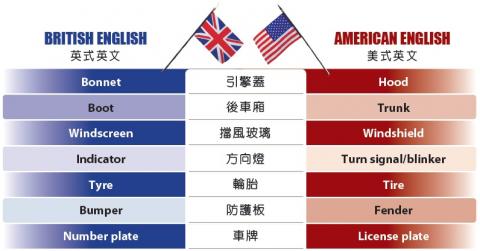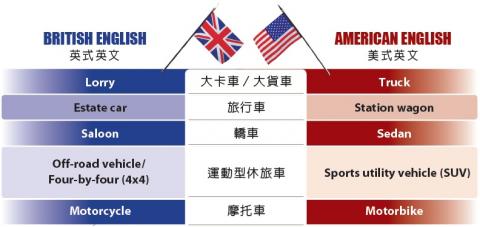It is perhaps unsurprising there are so many distinctions between British and American English when it comes to automobiles: they were invented long after American independence.
In the 1890s, before motor cars were in wide usage, horse-drawn wagons called “shooting-brakes” were used to transport shooting parties and their guns, ammunition and game from the hunt to the estate. In the 1900s, automotive models, with plenty of storage space in the back, were made for this purpose. The terms “shooting-brake” and “estate” were used interchangeably for these in England during the 1920s and 1930s, after which the former term largely disappeared.
In the US, cars with storage space in the back (initially, these were often specially converted Model T Fords) were used to carry people and their luggage to and from train stations. These became known as station wagons.

The distinction between estate car and station wagon still exists in British and American English, as does that between the words for a type of passenger car: in British English, a “saloon” — derived from the French salon, meaning “gathering” — and in American English a “sedan” — perhaps inspired by the “sedan chair” (a wheel-less compartment carried by two people and seating a single, usually wealthy, individual) — after the Speedwell Motor Car Co. of Dayton, Ohio, US, began manufacturing the Speedwell Sedan in 1911.
(Paul Cooper, Taipei Times)
英式英文和美式英文的汽車用語有很多不同,或許不足為奇──畢竟美國脫離英國獨立後許久,汽車才被發明出來。

在汽車尚未普及的一八九○年代,稱做「shooting-brakes」(獵裝車)的馬拉貨車被用來將狩獵隊及其槍枝、彈藥和獵物,從狩獵區載運到莊園(estate)。一九○○年代所製造的車尾有大型置物空間的車款,即是為此目的而設計。「shooting-brake」和「estate」這兩個詞在一九二○、三○年代的英格蘭常交替使用,後來「shooting-brake」一詞則大致不用了。
在美國,車尾有置物空間的汽車(最初常是特別改裝的福特T型車)用於往返火車站,以載運乘客與行李。這樣的車稱為「station wagons」(旅行車)。
英式和美式英文中仍有「estate car」和「station wagon」之區別,一種載客汽車的名稱在英式和美式英文中也有所不同:轎車∕房車在英式英文中稱為「saloon」」──源自法文「salon」(沙龍)一字,意為「聚會」;美式英文則稱做「sedan」,沿用美國俄亥俄州岱頓市的Speedwell 汽車公司一九一一年開始生產的「Speedwell Sedan」車款名。該車型名稱之靈感來源或許是「sedan chair」(轎子)──由兩人扛著、可乘坐一個人(通常是有錢人)的無輪車廂。
(台北時報林俐凱譯)

In an effort to fight phone scams, British mobile phone company O2 has introduced Daisy, an AI designed to engage phone con artists in time-wasting conversations. Daisy is portrayed as a kindly British granny, exploiting scammers’ tendency to target the elderly. Her voice, based on a real grandmother’s for authenticity, adds to her credibility in the role. “O2” has distributed several dedicated phone numbers online to direct scammers to Daisy instead of actual customers. When Daisy receives a call, she translates the scammers’ spoken words into text and then responds to them accordingly through a text-to-speech system. Remarkably, Daisy

Bilingual Story is a fictionalized account. 雙語故事部分內容純屬虛構。 Emma had reviewed 41 resumes that morning. While the ATS screened out 288 unqualified, she screened for AI slop. She could spot it a mile away. She muttered AI buzzwords like curses under her breath. “Team player.” “Results-driven.” “Stakeholder alignment.” “Leveraging core competencies.” Each resume reeked of AI modeling: a cemetery of cliches, tombstones of personality. AI wasn’t just changing hiring. It was draining the humanity from it. Then she found it: a plain PDF cover letter. No template. No design flourishes. The first line read: “I once tried to automate my

Every May 1, Hawaii comes alive with Lei Day, a festival celebrating the rich culture and spirit of the islands. Initiated in 1927 by the poet Don Blanding, Lei Day began as a tribute to the Hawaiian custom of making and wearing leis. The idea was quickly adopted and officially recognized as a holiday in 1929, and leis have since become a symbol of local pride and cultural preservation. In Hawaiian culture, leis are more than decorative garlands made from flowers, shells or feathers. For Hawaiians, giving a lei is as natural as saying “aloha.” It shows love and

1. 他走出門,左右看一下,就過了馬路。 ˇ He walked outside, looked left and right, and crossed the road. χ He walked outside and looked left and right, crossed the road. 註︰並列連接詞 and 在這句中連接三個述語。一般的結構是 x, y, and z。x and y and z 是加強語氣的結構,x and y, z 則不可以。 2. 他們知道自己的弱點以及如何趕上其他競爭者。 ˇ They saw where their weak points lay and how they could catch up with the other competitors. χ They saw where their weak points lay and how to catch up with the other competitors. 註:and 一般連接同等成分,結構相等的單詞、片語或子句。誤句中 and 的前面是子句,後面是不定詞片語,不能用 and 連接,必須把不定詞片語改為子句,and 前後的結構才相等。 3. 她坐上計程車,直接到機場。 ˇ She took a cab, which took her straight to the airport. ˇ She took a cab and it took her straight